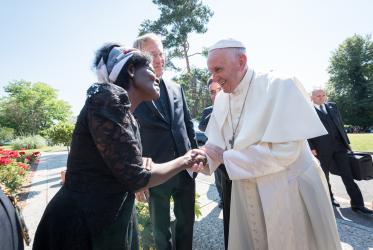“What is the role of churches in peace-building? How are they actually involved? Which are the ecumenical challenges, and especially which are the ecumenical opportunities that arise from joint efforts at peace building?”
These were some of the questions on the table as the Executive of the Joint Working Group (JWG) of the World Council of Churches (WCC) and the Roman Catholic Church met in Dublin, Ireland on 24-26 April.
In a communiqué issued on 27 April, the group stressed that migration and peace-building in situations of violence are the two burning issues that the JWG wants to address more specifically during its present mandate.
“Our meeting was particularly fruitful because we are successfully following a path of growing collaboration between the Catholic Church and the World Council of Churches in matters that profoundly affect the lives of millions of people: violence in the name of religion and the huge challenge of forced migration,” said H.E. Msgr Brian Farrell, the secretary of the Pontifical Council for Promoting Christian Unity.
”Our aim is to strengthen the ways Christians from different churches work together in responding to these enormous challenges,” Farrell added.
The JWG Executive also said, “it is most likely that cooperation on the United Nations’ 2030 agenda with the Sustainable Development Goals (SDGs) will grow at all levels.”
“A new platform for work on the SDGs developed, bringing together Caritas Internationalis, the Anglican Communion, Lutheran World Federation, ACT-Alliance and the WCC,” the JWG noted. “Most probably others will join in the future who are already cooperating in the Ecumenical Advocacy Alliance which is working on HIV and Aids and food security. The severe famine that is developing the Horn of Africa and Northern Nigeria requires close cooperation of all these actors.”
“The JWG is a precious space where mutual trust is built,” reflected Fr Prof. Dr Ioan Sauca, WCC deputy general secretary and director of the Ecumenical Institute in Bossey. “This trust is a solid base for fostering cooperation between the Roman Catholic Church and the member churches of the WCC and for exploring new opportunities for common witness.”
“When we are praying, discussing and planning together as the JWG, we are led by our trust in God, who in Christ became human and is present through the Holy Spirit. Trust overcomes the fear to make oneself vulnerable, and opens the door to real dialogue and common action,” Sauca concluded.
Read full communiqué by the Executive of the JWG, 24-26 April 2017
Peacebuilding and migrants are future foci of Roman Catholic-WCC working group (WCC press release of 19 September 2016)









